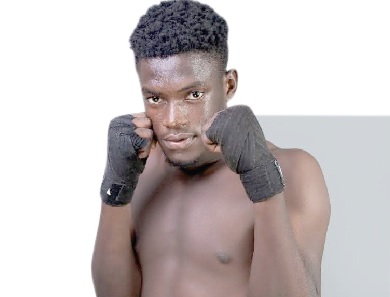Ghanaian boxing prospect Jonathan Mbanugu, known in the ring as Jon Power, is grappling with the haunting aftermath of a tragic fight that ended in the death of his opponent, Nigerian boxer Gabriel Olusegun Olanrewaju.
The 22-year-old pugilist is now at a crossroads, unsure whether he will lace up his gloves again.
What was supposed to be an exciting international showdown ended in heartbreak on March 29, after just two rounds of action.
Olanrewaju, aged 40, collapsed against the ropes and lost consciousness. Immediate attempts by ringside medical staff and paramedics to revive him proved futile.
He was rushed to the nearby Korle-Bu Teaching Hospital but was pronounced dead minutes later. What was meant to be a stepping stone in Jon Power’s blossoming career quickly descended into horror.
Post-mortem results have since confirmed that the Nigerian pugilist died of cardiac arrest, according to media reports in Nigeria citing the Secretary General of the Nigerian Boxing Board of Control (NBBoC), Oluremi Aboderin.
However, in Ghana, officials have declined to publicly release the report until a High Court judge ratifies it.
Investigation
Nonetheless, the fallout from the incident is far from over. The Ministry of Sports and Recreation this week inaugurated a seven-member committee to probe the circumstances surrounding the fight.
Authorities in Nigeria are also demanding answers from the Ghana Boxing Authority (GBA), citing concerns about the conditions under which the bout was sanctioned.
Back in Accra, Jon Power is struggling. Two weeks on from the tragic fight at the Bukom Arena, the psychological weight of that night continues to torment him.
His once-promising career hangs in the balance, as he questions whether he has the mental fortitude to ever step back into the ring.
Adding to the trauma is the wave of vitriol directed at the young boxer on social media. A viral video captured Jon Power speaking to ring announcer Mohammed Amin Lamptey moments after the fight. In it, he appeared unaware of the full gravity of what had happened and expressed joy over the victory—one that has since been struck from the records.
Upon realising the seriousness of the situation, Power quickly changed tone and offered prayers for his opponent's recovery, though it was tragically too late.
“He is very sad, down and distraught and has been struggling to cope with what has happened,” said his manager, Gordon Frimpong of Osebor Boxing Management and Promotions.
“All the people insulting Jon Power are shameless and inconsiderate. Who says he was excited? These things always happen in sports and this is not the first time [in boxing] and it certainly wasn’t Jon’s fault.”
Mr Frimpong revealed that Jon Power’s mother has been emotionally shattered by the incident and has urged her son to quit boxing altogether.
In response, the promoter and a team of veteran trainers visited the boxer’s home in a bid to console and counsel him through the trauma.
“We showed him videos of similar tragedies in boxing to let him know he's not alone and that even the greats have walked this difficult path,” he disclosed to the Daily Graphic.
“These interventions have helped lift some of the guilt from his shoulders. He’s beginning to heal, and we believe he’ll return to the ring soon. This is his livelihood—we can’t let one tragic event end his future.”
Trauma and support
Boxing is a sport that demands immense physical and mental resilience. Jon Power’s ordeal underscores the urgent need for comprehensive support systems that address both the physical and psychological well-being of boxers and other athletes—particularly those facing traumatic experiences or navigating the challenges of early retirement.
Indeed, the sport is no stranger to such heart-wrenching stories. British legend Barry McGuigan remains haunted by the death of Young Ali, who fell into a coma and died weeks later following their 1982 fight in London.
The tragedy shaped McGuigan’s life and spurred him to successfully campaign for tighter medical protocols around boxing matches in the UK.
Chris Eubank, another British icon, still carries the burden of his brutal 1991 clash with Michael Watson. Though Eubank won the fight, Watson suffered catastrophic brain injuries and spent 40 days in a coma.
The guilt altered Eubank’s entire approach to boxing—he avoided knockouts and sought points victories in his subsequent bouts.
In a tearful reunion years later on Piers Morgan’s Life Stories, Eubank apologised to Watson, who gracefully responded: “Let’s move on... we are born warriors, we are real.”
Nigel Benn, the ‘Dark Destroyer’, lived with a heavy conscience for over a decade after his 1995 slugfest with American Gerald McClellan, who was left permanently disabled.
Benn later found peace through faith and eventually reunited with McClellan at a charity dinner in London in 2007, where emotions ran high but forgiveness prevailed.
Now, Jon Power finds himself in similar emotional territory. His story adds to the long list of boxers whose careers have been derailed by tragedy—not through fault or malice, but by the brutal realities of the sport.
For the Ghanaian boxing authorities, the incident sparked urgent calls for reform. The ongoing inquiry into Olanrewaju’s death is expected not only to determine what went wrong at the Bukom Arena but also to propose reforms to safety protocols for professional fights to safeguard the health of boxers.
The tragic events of March 29 have, sadly, become another chapter in boxing’s bloodstained history — but they may yet spark overdue reforms in the sport in Ghana.
For Jon Power, his road to recovery — both personal and professional — will be long, but the story of how he faces and overcomes this moment could ultimately define him.

